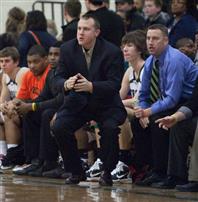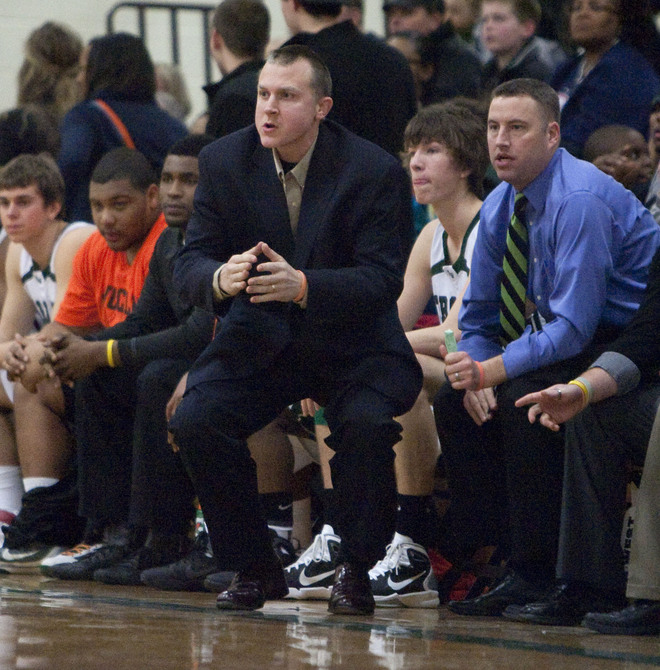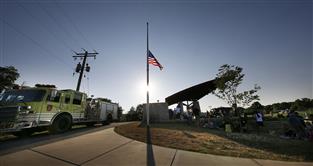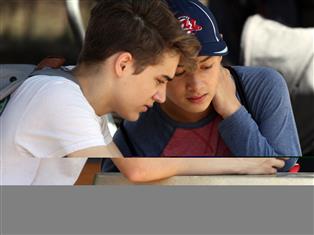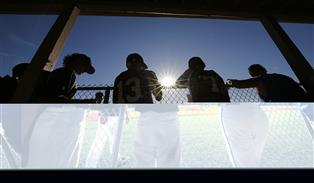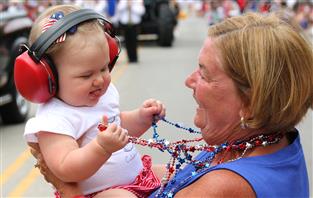It has been a year this week that Wauwatosa West boys basketball coach Mike Landisch got hit with the worst news of his 31 years on this earth.
Plagued with severe back pains that made walking and sitting for extended periods difficult, Landisch decided to seek a doctor's advice. The initial diagnosis was a pulled muscle.
When Landisch and his wife, Colleen, finially went in to see the results of a CT scan, their life turned around.
"He said he had pretty bad news. They found a malignancy on my left kidney," Landisch said. "They also found a couple tumors within my stomach area as well.
"My wife and I were in shock."
Landisch quickly thought about the future and what it held for Colleen and daughter, MaKenna, who had turned one just before the diagnosis.
"You think about a lot of different things," he said. "I thought of her (Colleen) and my child. That's number one. You think about your outcome, which could possibly be death, of course."
Colleen will never forget the moment.
"It's a shock. You don't think of it happening since he was just 30 years old," she said. "That took a while to sink in for both of us. We went home and had our meltdown.
"We talked about what do we do now. We wanted to make sure this didn't change us and we wanted to get right back to work."
Landisch immediately told Mike Hetzel, the Tosa West athletic director at the time, and then told Kristin Bower, the principal at Eisenhower elementary school where he teaches.
But the most difficult part of the day was to tell his team, especially because of his senior class. He had known Barry Ballinger, Sam Krenzien and Ray Sterling since they were in fifth grade.
"I am so close to my team. They are a huge part of my life. They're another part of my family," Landisch recalled. "Seeing the initial look on their face, it was heartbreaking - a lot of open mouths, a lot of heads going down, tears from some of the kids.
"They couldn't believe it. I couldn't believe it either. Not only couldn't, but didn't want to believe it. It's a year later and I still don't want to believe it."
A week and a half later the doctors removed his left kidney and some of the lymph nodes in his stomach in a six-hour surgery and then Landisch spent a week in the hospital.
"The lymph (nodes) worried me the most, not the kidney," Landisch said. "There are so many blood vessels down there they couldn't get everything. The doctor told me more than likely I was going to be dealing with this thing for a long time.
"I felt OK. My stomach had a scar and stitches. I had a pain in my stomach, but overall I felt pretty good."
But when he was recovering, it was the thinking that drove him crazy.
"Thinking was my own worst enemy. It still is," a tearful Landisch said. "It's tough. You think of outcomes, your future. You sit by yourself with no one to talk. You wonder, 'What's going to happen to me?'
"How is my family going to survive without me? My daughter will grow up without a father. I still think about this all the time - 10 to 15 times a day."
Colleen has been the strong one in this relationship.
"My wife has been huge - she's a rock," Landisch said. "She's really been there for me 100 percent of the time. She was there every hospital visit, every doctor's visit.
"She looked up everything on the Internet for me about cancer - medicines, drugs, what I should be doing for my body."
Landisch also praised his mother, Jean, for her support.
"My mom has been incredible, too," he said. "She helps us out any way she can. It's been an incredible effort by everybody, but those two in particular have been influential."
Landisch did find another type of therapy that was good for his recovery - coaching his basketball team.
"It was and it still is (good for him). It's something you love to do," he said. "I just love coaching. To do something you love and to be around a group of kids you respect and love so much is therapeutic.
"It puts you at ease. It's stressful at times, but it makes you feel like you're accomplishing something. Me not being there, I had that feeling that I was letting them down. That's the feeling I hate - I just left my team down."
When people found out about Landisch's battle with cancer, he quickly discovered how much people cared about him. Not only did Wauwatosa come together - Tosa East as well as Tosa West - but other communities as well.
Fundraisers popped up and everyone wore orange T-shirts (the color that represents the fight against kidney cancer) to show their support - administrators, students, opposing coaches, teams and students.
"I didn't know what to think. I was in awe," Landisch said. "It made me realize the impact I've had on people. The respect all the coaches and their teams have for my situation.
"It was heartfelt. I couldn't put it into words how I felt. I was so appreciative; it was so overwhelming."
Colleen also appreciated the support shown for her husband.
"It was truly overwhelming. People get cancer, so we felt blessed that this many people care about Mike. We never asked for it, but people did it anyway."
Landisch also received letters, cards and e-mail from strangers with cancer, telling them about their own stories and how they beat it.
"I received inspirational stories from people I didn't know at all," Landisch said. "People I had no contact with. It was overwhelming."
Today Landisch looks great. He has lost about 90 pounds and weighs between 180-185 pounds.
"One of my goals was to get back into shape, but cancer was not the way I wanted to do it," said Landisch, showing he hasn't lost his sense of humor. "I get to buy new clothes now."
He also is happy to share with people how he is doing, so don't be afraid to ask.
"I was always pretty open and honest about how my heath was," he said. "With something like this you need support and I need people around me pushing me."
Landisch suffers from nausea and stomach and tail bone pain, but he walks and exercises and is working full time as a teacher and coaching basketball, although he takes one day a week out from practice.
"Thank everyone for their support," Landisch said. "Thank Wauwatosa for all they've done. They have helped me emotionally."
Landisch and his doctor, Jonathan Triesman, realize the fight isn't over.
"Let them know I'm still fighting the battle," Landisch said.
More from Sports
- Volleyball: MVC Boys Club team takes third in volleyball nationals
- Wauwatosa Swordfish swim well in two meets
- Football: Milwaukee County Chargers battle elements for win
- Baseball: Seven Wauwatosa baseball players earn all-conference honors
- Wauwatosa West girls basketball coach Ashley Imperiale resigns
- Sports Notes: July 28, 2016
- Wauwatosa school district files lawsuit against WIAA over conference realignment
- Baseball: Michaelis leads Wauwatosa East past rival West in regional
- Football: Milwaukee County Chargers earn overtime win over Muskego
- Baseball: Wauwatosa East's season ends with regional final loss to Waukesha North





